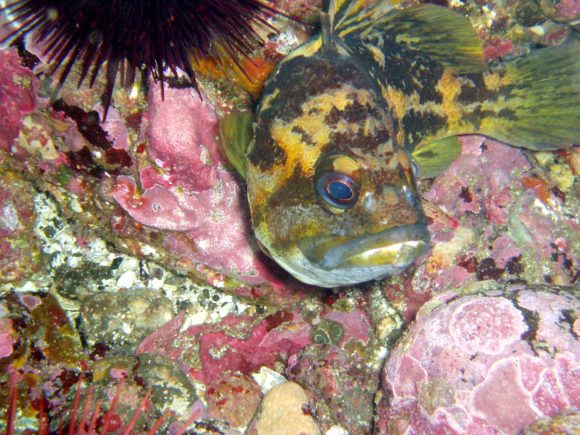
A black and yellow rockfish (Sebastes chrysomelas) in the Channel Islands National Marine Sanctuary off Southern California. Photo: Claire Fackler/CINMS, NOAA.
Warm-water species are rapidly increasing and cold-water species are decreasing
The study, published in the journal Nature Climate Change, covers species that are important for fisheries and that serve as food for fish, such as copepods and other zooplankton.
“The changes we’re observing ripple throughout local and global economies all the way to our dinner plates,” said co-author Malin Pinsky, an associate professor in the Department of Ecology, Evolution, and Natural Resources in the School of Environmental and Biological Sciences at Rutgers University–New Brunswick.
“We found dramatic evidence that changing temperatures are already reshaping communities of ocean organisms,” Pinsky said. “We found that warm-water species are rapidly increasing and cold-water marine species are decreasing as the global temperature rises. Changes like this are often disrupting our fisheries and ocean food chains.”
An international team of scientists also found evidence that species in some places can avoid declines by seeking refuge in cooler, deeper water – like plants on land that move to higher elevations to avoid heat, Pinsky said.
The scientists compiled the most comprehensive assessment of how ocean warming is affecting the mix of species in our oceans. They looked at fishes, invertebrates such as crabs and other crustaceans and plankton in the North Atlantic and North Pacific, across two continents and two oceans. They analyzed three million records of thousands of species from 200 ecological communities across the globe from 1985 to 2014.
Regions with stable temperatures (the Northeast Pacific and Gulf of Mexico, for example) show little change in species dominance, while warming areas (the North Atlantic, for example) are experiencing strong shifts toward the dominance of warm-water species, the study says.
Temperature is a fundamental driver for change in marine systems, with restructuring of communities in the most rapidly warming areas. Still, the data “suggest a strong prognosis of resilience to climate change for these communities,” the study says.
“We’re now trying to understand how the changes we see in the ocean compare with those on land and in freshwater ecosystems,” said Pinsky, who is also a sabbatical professor at the German Centre for Integrative Biodiversity Research (iDiv) Halle-Jena-Leipzig.
Scientists at many institutions, led by the Scottish Association for Marine Science, contributed to the study.
Editor’s Note: this article originally appeared in Rutgers Today.

